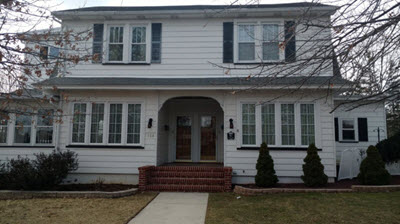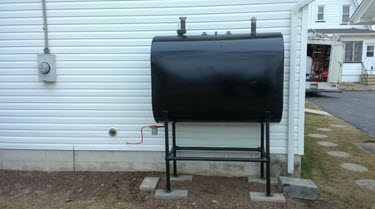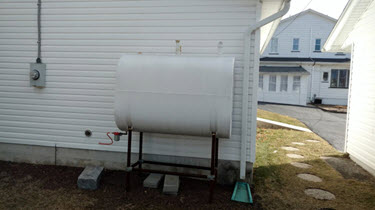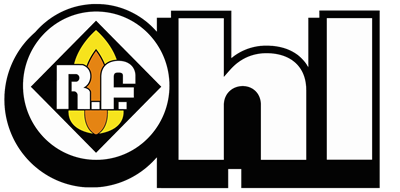New Oil Tank Prevents Problems For Lehighton PA Homeowner
 There’s an old saying: An ounce of prevention is worth a pound of cure. For our homeowner in Lehighton PA, that ounce probably prevented gallons of trouble. Gallons of oil that is.
There’s an old saying: An ounce of prevention is worth a pound of cure. For our homeowner in Lehighton PA, that ounce probably prevented gallons of trouble. Gallons of oil that is.
We were doing regularly-scheduled maintenance on our homeowner’s outdoor 275-gallon oil tank. There, we found signs of rust on the bottom of it. These indicated that it could start leaking at some point.
Our recommendation was for our homeowner to replace the tank right away. Sure, there wasn’t a problem now. But, an oil leak is the kind of problem you want to avoid. And, the tank was 20 years old. On average, they don’t last much longer than that.
It would be a significant investment. Understandably, our homeowner had plenty of questions. We made sure to spend the time to answer all of them. In the end, he felt confident about replacing the unit now.
Problem: A 20-year-old, 275-gallon oil tank showed signs of rust on the bottom.Solution: Replaced the tank with a new 275-gallon model.
How Do You Know When An Oil Tank Is Rusty?
While rust is usually pretty easy to spot, that’s not always the case. In many instances, the damage begins on the inside. Then, after a while, signs of it start showing up on the exterior.
With this job, there wasn’t a lot of telltale red or orange rust on the outside. But, there were signs of it in a few spots near the bolts on the legs. And, there were dark grey and black streaks along the bottom.
These markings indicated problems. Like most units this old, it was rusting from the inside out. Even before it started leaking, there could be other issues.
At this point, there would also be a significant amount of debris and sediment in the tank. As long as it has a lot of oil in it, this isn’t a huge deal. But, if the oil gets low, some of that sludge will make its way through the rest of the system.
When that happens, problems occur. The sludge can clog up lines in the system. Eventually, it will seize up and stop working.
We can sometimes fix a backup or breakdown, but it’s often expensive. And, it’s likely to happen when it’s cold out. Then, you’ll be left without heat or hot water for a few days in the winter.
Meanwhile, the rust, in particular, causes other problems. It means the tank is starting to deteriorate. Eventually, it will become compromised. The rust will cause holes to form in the tank and oil will leak out.
What Happens When An Oil Tank Leaks?
 A leaky means problems not only for your wallet. It can also potentially affect your health and your home. That’s why it’s important to act quickly if you notice signs of rust or especially a leak.
A leaky means problems not only for your wallet. It can also potentially affect your health and your home. That’s why it’s important to act quickly if you notice signs of rust or especially a leak.
First of all, remember that oil is combustible. After all, that’s why you’re using it to heat our home. If enough oil leaks out, there’s a fire hazard.
Next, the vapors are toxic. Exposure is particularly a problem if the tank is inside the home. If enough oil leaks out, you or your family may start to feel sick. Exposure to oil vapors causes dizziness, nausea, and increased blood pressure. If there’s a lot of it and it’s not cleared out, it becomes difficult to breathe.
In this case, that’s not as much of an issue for this homeowner. The unit is outside so that those vapors wouldn’t be as concentrated. But, the cleanup process for an outdoor tank can quickly become a nightmare.
Once the oil begins seeping into the ground, you’ll need a professional to clean it up. Oil in the ground is a big environmental hazard.
Depending on how much oil leaked out by the time you found it, cleanup could cost in the thousands. That’s on top of the cost to replace your tank.
What’s more, your homeowner’s insurance won’t necessarily cover the cleanup. In some cases, they may chip in. But, most new policies are not that generous. Many times, they won’t pay out at all unless the oil seeps onto someone else’s property or contaminates groundwater.
These reasons are why we recommend our homeowner replace his unit now. Sure, it wasn’t leaking yet. And, there was no telling how long before it happened. It could have been a few more years.
Or, it could have been just a few days. And, it could go undetected for a while. The longer it leaked, the more expensive it would have been to clean up. In the end, our homeowner didn’t want to take that risk.
What Does It Take To Replace An Oil Tank?
 It’s not especially difficult to remove an old tank. But, we need to make sure we do it properly. That’s because of all the potential hazards that come with the oil. Along with your safety, we also need to consider local, state and federal guidelines.
It’s not especially difficult to remove an old tank. But, we need to make sure we do it properly. That’s because of all the potential hazards that come with the oil. Along with your safety, we also need to consider local, state and federal guidelines.
To do this correctly, we follow all the steps down to the letter. That starts with pulling permits and checking for any other local regulations. From there, we pump out the remaining oil. The oil that’s not affected by sediment can be used later.
Meanwhile, that sludge at the bottom must be dealt with as well. We clean out the bottom of the tank and transport it to a specialized facility for proper disposal.
Then, we’ll be ready to dismantle the old tank and remove it. From there, we ensure the tank is decommissioned and appropriately marked. Finally, the tank ends up in a special yard where it will be inspected and then scrapped.
This way, our homeowner never has to worry about a problem down the line. There’s no chance of getting fined for doing work outside the home without municipal permits. And, he won’t run into any problems with contamination or the old tank showing up in a landfill or other place where they can’t be left.
Then, all that’s left is to install the new tank. In all, the entire process takes less than a day. And, it’s much easier to handle now than waiting for the unit to spring a leak. With proper maintenance, it will be decades before our homeowner has to worry about this again.
If you are looking to explore ways to save money on your heating bills or have a problem with your current system, give us a call here at RF Ohl. We have the experience and the know how to make sure you are comfortable in your home, every day of the year, and save money at the same time.
